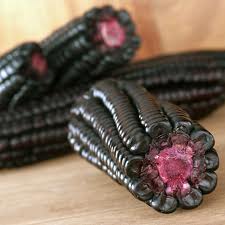These dark beans also contain polyphenols, which prevent cholesterol from forming plaque and clogging blood vessels, and in turn decrease your risk for diabetes-related blood vessel inflammation and heart disease.
Source: http://www.everydayhealth.com/type-2-diabetes-pictures/colorful-diabetes-fighting-foods.aspx#/slide-3
This beautiful little Black Berry is not really a berry at all instead its really and aggregate fruit. This means that each little seeded fruit is attached to the core kind of like corn kernels on an ear. The great thing about Black Berries is that they are full of great things that are great for Diabetics. For one they are full of dietary fiber and we know that fiber is great for us Diabetics, they have polyunsaturated fats which really do the opposite of most fats in that they actually lower your bad cholesterol. They help us to have a healthier heart.
Antioxidants are another great benefit of this berry and again the anthocyanin pigments in the berry are high as well.
Blackberries are rich in antioxidants. They have anthocyanins, which will work to prevent the effects of aging, cancer and neurological diseases. They also help to fight diabetes and bacterial infections. The ellagic acid in blackberries can help to reduce blood pressure. Blackberries contain rutin, which is a flavonoid that works to improve blood circulation. It also acts as an anti-inflammatory and can lower the risk of heart disease. The Gallic acid in blackberries is an anti-fungal and anti-viral antioxidant that is used to help treat psoriasis and hemorrhoids. Blackberries also contain p-coumaric acid which can lower the risk of stomach cancer. Vitamins A and C work together as antioxidants to help strengthen the immune system and fight free radicals.
Source: http://www.fitday.com/fitness-articles/nutrition/healthy-eating/the-nutrition-of-blackberries.html
Absorbs Blood Sugar: The main trouble of diabetes is that foods
that are broken down into sugar do not get absorbed into the body cells
due to lack of insulin. According to a study conducted by University of
Sydney, ginger helps the body's cells absorb sugar without the help of
insulin. This is a revolutionary discovery that would help control
diabetes without insulin injections. The gingerols present in ginger
control diabetes or the high blood sugar levels of an individual by
aiding the absorption of sugar into the muscles.
Read more at: http://www.boldsky.com/health/disorders-cure/2012/ginger-diabetes-benefits-030371.html
Read more at: http://www.boldsky.com/health/disorders-cure/2012/ginger-diabetes-benefits-030371.html
Source: http://www.everydayhealth.com/type-2-diabetes-pictures/colorful-diabetes-fighting-foods.aspx#/slide-5
The team also discovered that the Beauregard variety of sweet potatoes - which makes up about 85 percent of the production in North Carolina - has essentially the same protein patterns as a commercial dietary supplement known as Caiapo, marketed to control blood glucose in diabetics. Developed by Japanese scientists, Caiapo is derived from the peel of white-skinned sweet potatoes, which have been consumed in Japan for many years as a remedy for anemia, hypertension and diabetes.
http://www.cals.ncsu.edu/agcomm/magazine/winter07/diabetes.html
Testing shows that the levels of antioxidants in blue corn are even higher than those found in blueberries. Animal studies suggest that blue corn antioxidants help protect against obesity and diabetes.
Source: http://www.everydayhealth.com/type-2-diabetes-pictures/colorful-diabetes-fighting-foods.aspx#/slide-7
There is so much more than we could ever imagine out there for us to learn about. I think that as we learn about our food sources and the benefits that some of them have for us as Diabetics and Pre-Diabetics then we can learn more about control of our blood sugars. Whats wrong with changing the color of our diets? I think we may enjoy these foods just as much and maybe we can teach those out there about living a healthier life style with colorful foods.
Let's keep this conversation going so many wonderful things to read and learn. As we do this lets also share and talk and keep communication happening between us as Diabetics in a large community and share with those that care for us.
If you are interested in being a guest blogger or have some information to share or an idea to share connect with me at diabetic.day2013@gmail.com or on g+ and twitter at #DiabeticDay.











